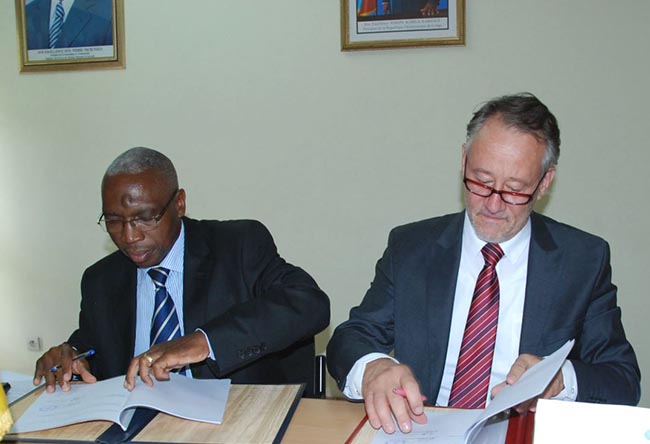CEPGL and Interpeace formalize collaboration on peace in the Great Lakes

The Economic Community of the Great Lakes Countries (CEPGL) and Interpeace have signed a Memorandum of Understanding (MoU) to collaborate on efforts towards the achievement of sustainable peace in the Great Lakes region of Africa.
The MoU was signed on 14 April 2016 at the CEPGL Secretariat in Gisenyi, Rwanda, by CEPGL Executive Secretary Herman Tuyaga and Interpeace Regional Director for Eastern and Central Africa, Johan Svensson.
“This partnership will make an important contribution to the consolidation of peace in the Great Lakes region,” CEPGL Executive Secretary Tuyaga remarked at the signing ceremony.
The CEPGL is an intergovernmental organization that brings together Burundi, Rwanda and the Democratic Republic of Congo (DRC). It was created in 1976 to ensure the peace and security of the three member states, as well as to develop public interest activities that promote trade and the free movement of persons. The CEPGL also promotes closer cooperation among the three countries in relation to political, economic and social life in the region.
On its part, Interpeace implements the Cross Border Dialogue for Peace in the Great Lakes programme in the three CEPGL member states, working in collaboration with six partner organizations in Burundi, Eastern DRC and Rwanda. The cross border programme aims to help build cooperation and trust between Burundian, Congolese and Rwandan citizens who can act as change agents for peace at the regional level. During two participatory action research processes conducted in the framework of this programme that directly reached over 2,000 people, citizens clearly expressed their hopes in the CEPGL and the crucial role it can play for peace, collaboration and development in the region. It is based on this call that Interpeace and the CEPGL established a formal partnership.
“The regional perspective is key when it comes to sustainable peace in the Great Lakes region. This is why it is strategic for Interpeace to have this partnership with CEPGL, in order to contribute to durable peace, security and economic development in the region,” Interpeace’s regional Director, Johan Svensson said.
One of the most important points of convergence between CEPGL and Interpeace is the shared trust in the potential of the youth to act as effective agents of peace in the region.
“Although the youth have historically been manipulated to fuel conflict in the region, they are also the key to a peaceful future. We look forward to continuing our work with CEPGL on youth, to help support young men and women in their role as constructive forces for peace and development,” Mr Svensson added.
Interpeace launched the cross border programme in 2013. Its programme partners are Never Again Rwanda (NAR) in Rwanda; the Conflict Alert and Prevention Centre (CENAP) in Burundi; the Réseau d’Innovation Organisationnelle (RIO) and l’Action pour la Paix et la Concorde (APC) in the DRC’s South Kivu province, as well as Pole Institute and the Centre d’Etudes Juridiques Appliquées (CEJA) in the country’s North Kivu province.























